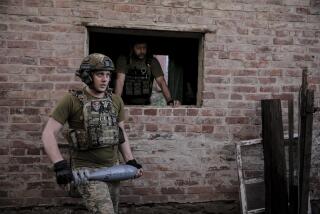Putin--Toward Democracy After Rehab
- Share via
The star of the millennium show was, unquestionably, Boris Yeltsin: His New Year’s Eve valedictory alone marked a change of historical era. Riding the impetus of the centrist victory in Duma elections two weeks before, he resigned six months early to prepare for the likely election in March of his designated successor, acting President Vladimir V. Putin.
What should we make of Yeltsin’s latest return from the political grave? Given his present vile reputation in the West, inveterate Russophobes and sour Gorbophiles will doubtless call his resignation the ultimate maneuver of “The Family” and its oligarchs to keep power by passing it to a KGB spymaster, his ratings bolstered by a Chechen war fomented for the purpose. But what if Yeltsin’s valedictory is read in the context of his entire career? In this case, it appears as an astute act of statesmanship to preserve his legacy for Russia.
And despite his numerous flaws and mistakes, such a legacy does exist. For Yeltsin, unlike Mikhail Gorbachev, clearly understood that communism could not be reformed but had to be dismantled. Thus in 1990, he was the first Communist leader to quit the party, the next year forcing on Gorbachev Russia’s first democratic election for the presidency. In 1996, when the Communists seemed set to make a comeback, he resisted the temptation of force and fended them off at the polls. Now, after holding on four more years against chronic illness, he has relinquished power voluntarily. What more can one ask by way of commitment to constitutional procedures?
It is often forgotten that Yeltsin never had a parliamentary majority for reform. So in Russia, unlike in Poland, advocates of “shock therapy” conversion to the market had only six months of undivided power. Indeed, by December 1992, the old Soviet nomenklatura had forced Yeltsin to make their man, Viktor S. Chernomyrdin, prime minister, thereby inaugurating a decade of off-again on-again reform.
Thus during the crucial transition of 1990-92, insiders were able to purchase raw materials at Soviet prices for resale at world prices and pocket the profits; they became the infamous oligarchs. Again unlike Poland, Russia had no Western credit to tide it over the transition; Western aid to Russia has not been significantly greater than the Mexican bailout of 1995. It was the same circumstances that in 1994 produced Anatoly B. Chubais’ fire-sale privatization of obsolete state industries to force their modernization. It was these circumstances that produced the ultimate scandal of granting the oligarchs “shares for loans” to bankroll the crucial campaign of 1996.
Then the crash of 1998 ended this speculation-driven economy. In the short run, this forced Yeltsin to take as prime minister Yevgeny M. Primakov, who immediately set Communists over the economy and began to eye the presidential succession. In the long run, the crash cleared the air since it cut off foreign credit and forced Russia to produce for itself. At the same time, it became apparent that Primakov and his “left” allies had no alternative program to offer.
So last March, as the economy slowly improved, Yeltsin fired Primakov and began the search for a successor to his own legacy. In August, when Islamic militants attacked Russian territory adjoining Chechnya, the search settled on Putin.
But the war was not started to launch Putin’s career. There is a real Chechnya problem--of terrorism, of Russia’s territorial integrity and of national credibility when attacked. Then NATO’s Kosovo war, to the average Ivan a blatant display of American hegemonism camouflaged as globalized morality, brought home like nothing else the contempt in which the West now held Russia. Victory in Chechnya thus came to stand for reborn Russian pride. We must expect, therefore, that Chechnya will end up largely occupied, even if it cannot be wholly subdued.
And what manner of man is Putin? He is not an opaque mystery, as some would have it, nor is victory in Chechnya his sole program. He has published an Internet document (https://www.pravitelstvo.gov.ru/english/statVP_engl_1.html) showing a keen understanding of the historical moment for Russia. This program amounts to a slower, more national version of the Yeltsin era’s reform aspirations. Thus, per Putin: “We can count on a worthy future only if we manage to naturally combine the principles of a market economy and democracy with Russia’s realities.” For “Russia will not soon, if ever, become a copy of the U.S.A. or, say, Britain, where liberal values have deep historical roots.” This decidedly does not mean return to “the Soviet regime, [which] failed to make the country flourishing, its society dynamic, its people free.” But it does entail realistic acknowledgment that Russians are not yet ready “to abandon traditional dependence on the state . . . especially in social policy.”
This sense of Russia’s distinctiveness does not mean withdrawal into confrontational isolation. Russia must remain part of the world economy, improving the climate for foreign investment and expanding participation in international economic organizations. The goal of this reform process is a renewed patriotism, a feeling of belonging to a great power that is based on economic and technological strength rather than military force. Is it necessarily chauvinist imperialism for Russia to aspire to a measure of national power and pride? All major nations do, including our own.
In sum, Putin’s program means paternalistic modernization through Westernization. But this is how our prize proteges, South Korea and Taiwan, made it to market democracy. Why expect that Russia, still in rehab from 74 years of communism, should already display the democratic refinements of the world’s luckiest and wealthiest nation?
More to Read
Sign up for Essential California
The most important California stories and recommendations in your inbox every morning.
You may occasionally receive promotional content from the Los Angeles Times.













